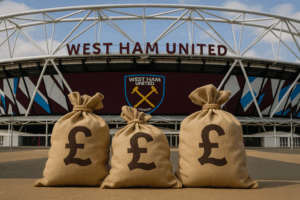[West Ham United](https://www.claretandhugh.info/its-official-director-of-football-role-finally-dead-at-west-ham/) may be on the brink of a seismic shift, not just on the pitch, but in the boardroom. As the club battles to avoid relegation from the Premier League, speculation intensifies around a potential change in ownership that could redefine the Hammers’ future.
Should West Ham drop into the Championship, the consequences will be swift and severe. Beyond the expected fire sale of first-team players, many fans believe relegation would finally prompt majority shareholder David Sullivan to sell his stake. The club’s valuation, once touted at £1.45 billion by vice-chair Karren Brady would decline, though a more realistic valuation by Forbes in May this year suggested £882m.
Fast forward four months and some analysts have a more conservative value of £400m-£600m, which has factored in the high potential of relegation, and a notable loss of £120m from revenue via broadcasting, match day sponsorship and commercial, merchandise and retail.
Relegation would mean massive devaluation of shares
---------------------------------------------------
Currently, West Ham’s ownership is split among David Sullivan (38.8%), Daniel Kretinsky (27%), Vanessa Gold (25.1%), WHU LLC (8%) and other investors 1.1%. Vanessa Gold, who inherited her stake following her father David Gold’s passing, has signaled her intent to sell. Reports suggest both her shares and Sullivan’s could be bundled together, creating a rare opportunity for a full-scale takeover. Kretinsky, meanwhile, is expected to reassess his position depending on the club’s fate.
Vanessa Gold is reportedly seeking a staggering £365m for her 25.1% stake, with Rothschilds tasked with finding a buyer. However, given West Ham’s precarious league position prospective buyers are in no rush, given the valuation will plummet if the club are relegated.
In September, ExWHUEmployee reported that a prospective buyer had toured West Ham’s Rush Green training ground along with other club facilities. The interested party is believed to be a U.S.-based consortium who were entertained by Albert Tripp Smith. Smith _(main image, above)_, who currently holds an 8% stake in West Ham, will be acutely aware that its value could diminish if the club faces relegation. Meanwhile, Amanda Staveley and PCP Capital Partners are also said to be keeping a close eye on the situation. Another contender is the Qatari investment group, which may view West Ham’s absence from European competition as an advantage, sidestepping potential conflicts with UEFA’s multi-club ownership regulations.
Buying West Ham in the Championship is a high risk, high reward play, a quick return to the Premier League would mean a jump in valuation by circa £100-£150m.

Even with new owners, West Ham’s spending power may be constrained. The Premier League’s Profit and Sustainability Rules (PSR) are set to be replaced by the Squad Cost Ratio model. Under this system, equity injections from owners won’t count as football revenue, limiting the ability to cover excessive spending. Ironically, a new owner may arrive just as financial flexibility tightens.
With regards to the London Stadium, despite supporters reservations and the likelihood of playing in a half empty stadium C&H can confirm that there is no straightforward exit clause that allows West Ham to walk away from the lease without significant financial and legal consequences. In addition the favourable financial terms means any prospective new owner is unlikely to explore alternatives options.
For Hammers fans, the hope is that new ownership will bring fresh ambition, smarter recruitment, and a return to the club’s East London roots. Many supporters believe David Sullivan and Karen Brady have turned West Ham into a vanity project, all spin and no substance. The disconnect between the fan base and the boardroom has never felt wider.